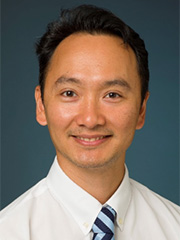Scientist profiles G-L
SRI profiles

Associate Professor
Sunnybrook Health Sciences Centre
2075 Bayview Ave., Room M1 102
Toronto, ON
M4N 3M5
Administrative Assistant: Jennifer Nguyen
Phone: 416-480-4141
Email: jennifer.nguyen@sunnybrook.ca
Fax: 416-480-5761
Education:
- B.Sc., 2001, microbiology, University of Manitoba, Canada
- MD-PhD, 2010, Faculty of Medicine, and department of biochemistry and medical genetics, University of Manitoba
- Residency, 2015, otolaryngology, head and neck surgery, University of Manitoba
- Research and clinical fellowship, 2016, otology/neurotology and lateral skull base surgery, University of British Columbia, Canada
- Clinical fellowship, 2017, otology/neurotology and lateral skull base surgery, University of Toronto, Canada
Appointments and Affiliations:
- Associate scientist, Biological Sciences, Hurvitz Brain Sciences Research Program, Sunnybrook Research Institute
- Assistant professor, department of otolaryngology—head & neck surgery, University of Toronto
- Otologist/neurotologist, cochlear implant surgeon, Sunnybrook Health Sciences Centre
- Associate member, Institue of Medical Science, University of Toronto
Research Foci:
- Stem cell and gene therapy
- Magnetic targeting delivery
- Cochlear implantation
- Blood-labyrinth barrier
- Inner ear drug delivery
Research Summary:
Sensorineural hearing loss is one of the most common disabilities in society and sets in place a gradual but ongoing degeneration of hair cells and auditory nerves of the cochlea. Hair cells help convert sound (acoustic) energy into neural (electrical) signals, which then travel via the auditory nerve to the brain where sound is interpreted. Injury to any part of this information highway will lead to irreversible hearing loss. The overall goal of Dr. Le's research is to develop therapeutic interventions that will regenerate this auditory pathway and restore normal hearing to those affected with hearing loss. The three specific aims of his laboratory include the following:
- investigating different techniques of magnetic targeting as a therapeutic delivery method to the cochlea;
- applying stem cell, gene, and refurbished drug therapy for regeneration of hair cells and auditory neurons;
- and studying the permeability of blood-labyrinth barrier of the inner ear.
Selected Publications:
See current publications list at PubMed.
- Mukherjee S, Kuroiwa M, Oakden W, Paul B, Noman A, Chen J, Lin V, Dimitrijevic A, Stanisz G, Le TN. Local magnetic delivery of adeno-associated virus AAV2 (quad YF)-mediated BDNF gene therapy restores hearing after noise injury. Molecular Therapy. 2021. 30(2): 519-533.
- Nateghifard K, Low D, Awofala L, Srikanthan D, Kuthubutheen J, Daly M, Chan H, Irish J, Chen J, Lin V, Le TN. Cone beam CT for perioperative imaging in hearing preservation Cochlear implantation–a human cadaveric study. J Otolaryngol Head Neck Surg. 2019. 48(1):65.
- Le TN, Straatman LV, Yanai A, Rahmanian R, Cathy Garnis, Urs Häfeli, Poblete T, Westerberg B, Gregory-Evans K. Magnetic stem cell targeting to the inner ear. J Magn Magn Mater. 2017 Dec 1;443:385–396.
- Le TN, Straatman LV, Lea J, Westerberg B. Current insights in noise-induced hearing loss: a literature review of the underlying mechanism, pathophysiology, asymmetry, and management options. J Otolaryngol Head Neck Surg. 2017 May;46(1):41.
- Le TN, Zhou QP, Cobos I, Zhang S, Zagozewski J, Japoni S, Vriend J, Parkinson T, Du G, Rubenstein JL, Eisenstat DD. GABAergic interneuron differentiation in the basal forebrain is mediated through direct regulation of glutamic acid decarboxylase isoforms by Dlx homeobox transcription factors. J Neuroscience. 2017. 37(36):8816-8829


